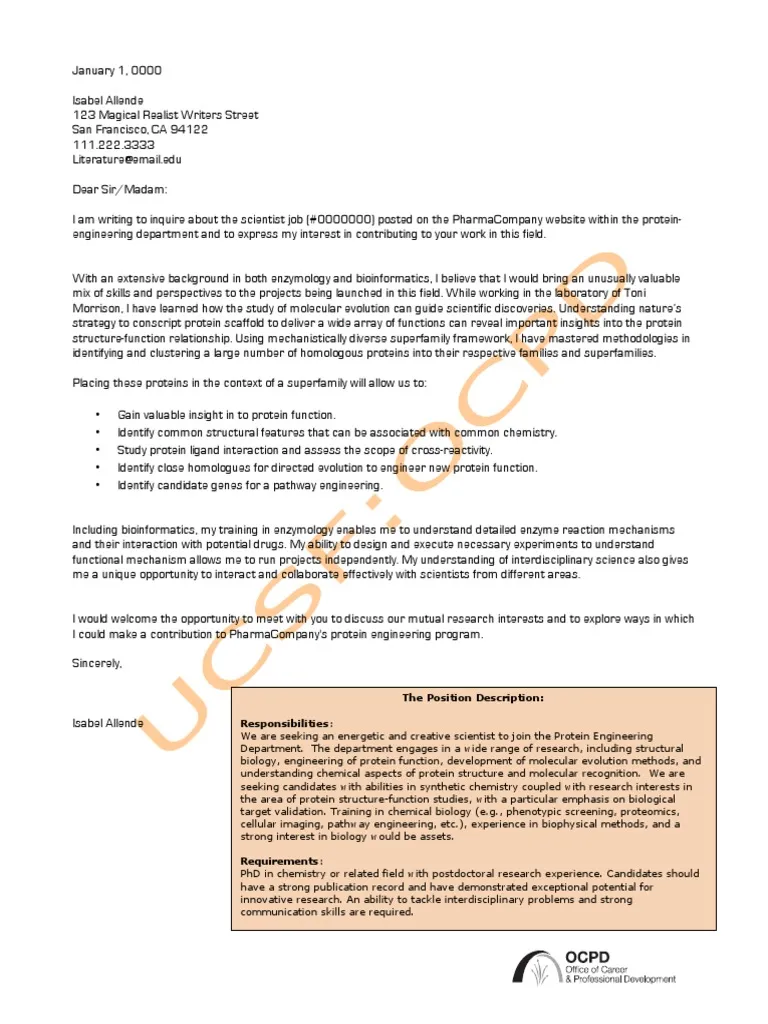Crafting a Compelling Cover Letter for the Science Industry
The science industry is highly competitive, making a well-crafted cover letter essential for job seekers. A cover letter is your first opportunity to make a positive impression and demonstrate why you’re the perfect fit for the role. It’s not just a formality; it’s a strategic tool to showcase your skills, experiences, and enthusiasm. In a field where precision and attention to detail are paramount, your cover letter must be impeccable in its presentation and content. It allows you to provide context to your resume and express your passion for the scientific field. This guide will provide you with the key elements to create a cover letter that stands out and helps you land your dream job in the science industry.
Understanding the Science Industry Landscape
Before crafting your cover letter, it’s crucial to understand the specific nuances of the science industry. This sector encompasses a diverse range of fields, including research and development, pharmaceuticals, biotechnology, environmental science, and more. Each area has its own specific requirements and expectations. Research the company and the specific role you’re applying for. Identify the key skills and qualifications they are seeking. Consider the company’s mission, values, and recent achievements. This research will inform your cover letter, allowing you to tailor your message and demonstrate your genuine interest in the opportunity and show how your skills align with the specific needs of the role and the company.
Key Skills and Attributes Employers Seek
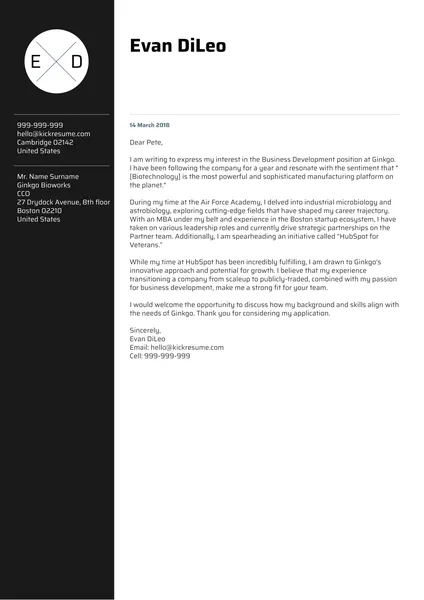
Science industry employers look for a specific set of skills and attributes. Technical proficiency is a given, but other soft skills are equally important. Critical thinking and analytical skills are essential to interpret data and solve complex problems. Communication skills are vital for conveying research findings and collaborating with colleagues. Attention to detail and accuracy are crucial for conducting experiments and recording results. Employers also value problem-solving abilities, teamwork, and the ability to adapt to changing environments. Highlighting these skills in your cover letter, supported by specific examples, will significantly increase your chances of success. Always align your skills with the job description’s specific requirements.
Highlighting Your Qualifications
Your cover letter is your chance to present your qualifications in a compelling way. Start by summarizing your relevant education, degrees, and certifications. Then, showcase your experience through specific examples. Describe your previous roles, the tasks you performed, and the results you achieved. Use action verbs to describe your accomplishments (e.g., ‘developed,’ ‘analyzed,’ ‘managed’). When possible, quantify your achievements with numbers and data (e.g., ‘reduced error rates by 15%,’ ‘managed a budget of $100,000’). Tailor your qualifications to match the requirements of the job description, emphasizing the skills and experience most relevant to the role.
Structuring Your Science Industry Cover Letter
A well-structured cover letter is easy to read and allows you to highlight your key qualifications. It typically includes these essential elements. Each section plays a crucial role in communicating your qualifications effectively. Consider using a professional and clear font, and keep the letter concise and focused. A clear structure helps the hiring manager quickly grasp your key qualifications and assess your suitability for the role.
Contact Information and Salutation
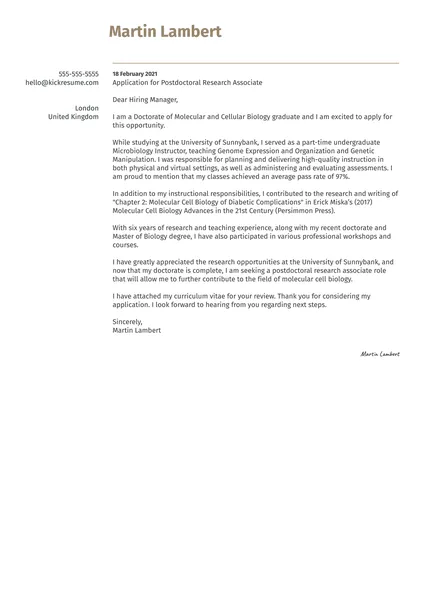
Start with your contact information, including your name, address, phone number, and email address. Then, include the date and the employer’s contact information (if known). Address the letter to the hiring manager by name, if possible; otherwise, use a professional salutation like ‘Dear Hiring Manager.’ Personalizing the salutation demonstrates your attention to detail and effort in researching the company. Ensure your contact information is current and professional, making it easy for the employer to reach you.
The Opening Paragraph Grabbing Attention
The opening paragraph is your chance to grab the reader’s attention and make a strong first impression. State the specific position you are applying for and how you learned about the opportunity. Briefly highlight your most relevant qualifications and express your enthusiasm for the role and the company. Avoid generic openings like ‘I am writing to express my interest.’ Instead, create an opening that is engaging and directly relevant to the job. Mentioning a specific project you admire or a shared value can make a strong and memorable start. The goal is to immediately convey your interest and demonstrate that you understand the role’s requirements.
Showcasing Your Relevant Experience
The body of your cover letter should showcase your relevant experience and skills. Use specific examples to illustrate your accomplishments and how you’ve contributed to previous projects or roles. Provide context to your experience by mentioning the company name, your role, and the duration of your employment. Focus on the responsibilities and achievements that align with the job description. Use action verbs to describe your tasks and quantify your results whenever possible. This section is where you demonstrate how your skills and experience make you the ideal candidate.
Quantifying Your Achievements
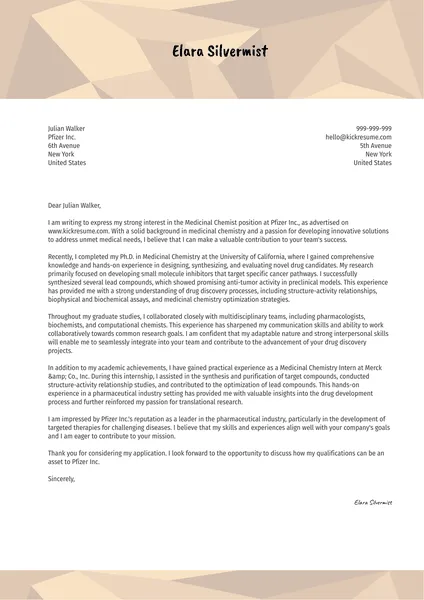
Whenever possible, quantify your achievements to demonstrate the impact of your work. Instead of saying ‘improved efficiency,’ say ‘improved lab efficiency by 18%.’ Use numbers, percentages, and data to support your claims and show concrete results. Quantifying your achievements adds credibility to your cover letter and provides a clear picture of your capabilities. This will make your accomplishments more impactful and help the hiring manager understand your value. Using data and metrics shows you pay attention to detail and have results to back up your work.
Tailoring Your Cover Letter
Customize your cover letter for each job application. Don’t use a generic template. Research the company and the specific role, and tailor your letter to their needs. Highlight the skills and experiences that align with the job requirements. Use keywords from the job description throughout your letter. Demonstrate your understanding of the company’s mission, values, and recent achievements. This level of personalization shows that you’ve put in the effort and are genuinely interested in the opportunity. The more tailored your letter is, the more likely you are to impress the hiring manager.
Formatting and Proofreading
Ensure your cover letter is professionally formatted, easy to read, and free of errors. Use a clean, readable font like Arial or Times New Roman. Use clear headings and bullet points to break up large blocks of text. Proofread your cover letter multiple times for typos, grammatical errors, and punctuation mistakes. Have someone else review your letter for a fresh perspective. Attention to detail is crucial in the science industry, and a polished cover letter reflects your professionalism and competence. A well-formatted and error-free cover letter makes a positive impression and indicates your attention to detail.
Writing a Strong Closing
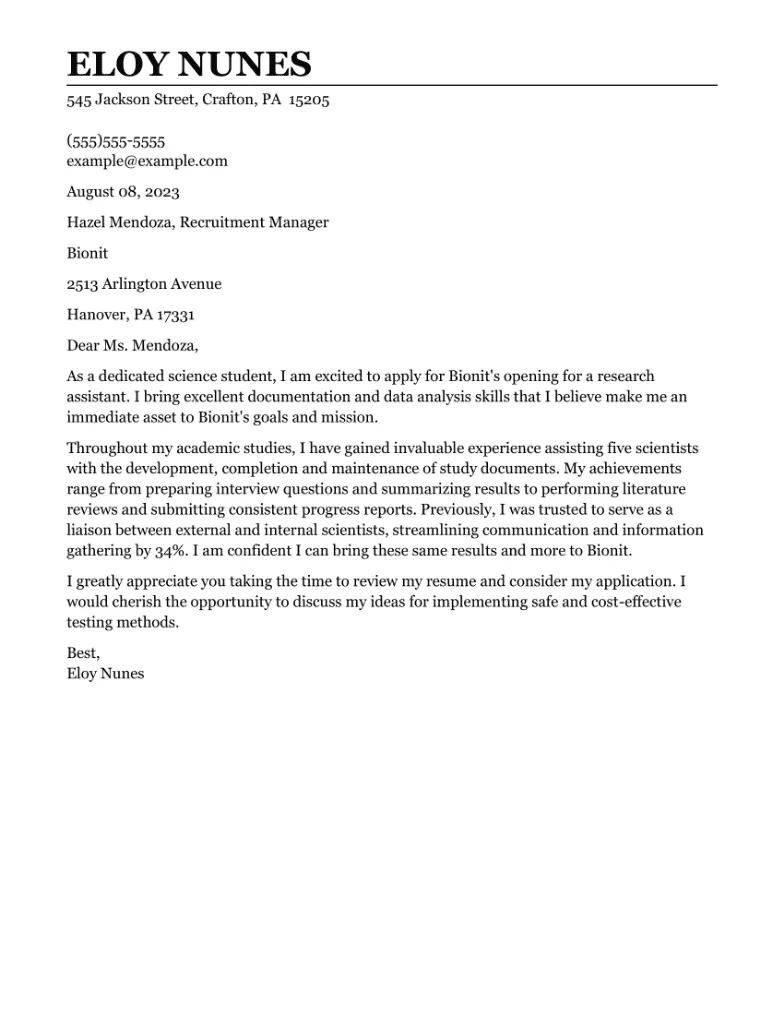
In your closing paragraph, reiterate your interest in the position and the company. Thank the hiring manager for their time and consideration. Clearly state how you plan to follow up. Indicate that you are available for an interview and provide your contact information again. A strong closing leaves a lasting positive impression and reinforces your enthusiasm for the role. Expressing your interest in an interview gives the hiring manager the final nudge to move you to the next stage.
Cover Letter Examples Science Industry
Reviewing cover letter examples is a great way to understand how to structure your own. Examples can help you tailor your language and format to resonate with the science industry standards. You will find various cover letter examples to help you craft an effective letter. The following examples will give you a good starting point.
Example Cover Letter for Research Scientist
A research scientist cover letter should emphasize your research experience, publications, and technical skills. Highlight any grants you’ve secured or projects you’ve led. Be sure to use scientific language and to focus on the specifics of your research areas. Illustrate your experience in developing and executing research plans, and the methodologies you’re familiar with. Mention your familiarity with scientific equipment and software, and focus on how your findings have contributed to scientific knowledge.
Example Cover Letter for Laboratory Technician
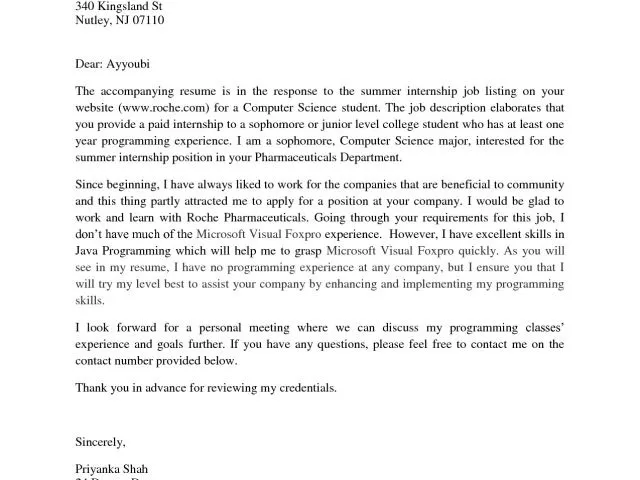
A laboratory technician cover letter should focus on your hands-on skills and your experience with lab equipment. Showcase your ability to follow protocols, conduct experiments, and maintain accurate records. Highlight your experience with various lab techniques and any specialized training you have. Demonstrate your attention to detail and your ability to work in a fast-paced environment. Mention any contributions you have made to lab safety protocols and the general lab environment. Be sure to describe your experience in sample preparation, data analysis, and lab maintenance.
Example Cover Letter for Data Analyst
A data analyst cover letter should highlight your analytical skills, your experience with data analysis tools, and your ability to interpret data and draw conclusions. Showcase your experience with statistical software and data visualization techniques. Highlight your ability to work with large datasets and to identify patterns and trends. Demonstrate your experience in building reports and presentations to communicate findings to stakeholders. Be sure to describe your experience in data cleaning and data quality assurance processes.
Common Mistakes to Avoid
Avoiding common mistakes can significantly improve your chances of landing an interview. By being aware of potential pitfalls, you can ensure that your cover letter reflects your professionalism and attention to detail. Make sure you do not make these crucial errors.
Generic Cover Letters
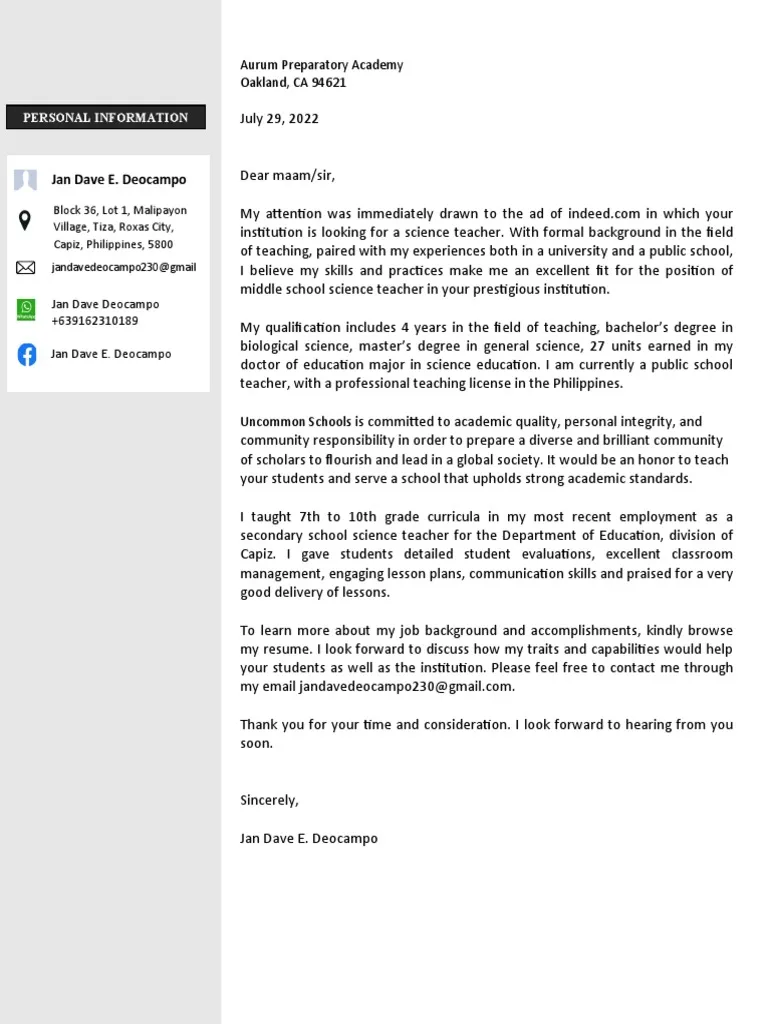
Avoid using generic cover letters that could be sent to any company. Tailor your cover letter to the specific job and company you are applying for. Show that you have researched the company and understand the role. Highlight the skills and experiences that are most relevant to the job description. A generic cover letter signals that you’re not particularly interested in the role or the company.
Focusing on Yourself Instead of the Employer
While it’s important to highlight your skills and accomplishments, focus on how you can contribute to the employer’s goals. Demonstrate your understanding of the company’s needs and how your skills can help them achieve those goals. Frame your experiences in terms of the value you can bring to the organization. Show that you’re not just looking for a job but that you want to contribute to the company’s success. Focus on what you can offer the company, and how your skills and expertise will benefit the team.
Typos and Grammatical Errors
Typos and grammatical errors can undermine your credibility and make you appear unprofessional. Proofread your cover letter multiple times. Ask someone else to review your letter for a fresh perspective. Ensure that your cover letter is free of errors before submitting it. A polished cover letter reflects your attention to detail and your commitment to excellence. Double-check all names, titles, and company information to ensure accuracy, and take the time to eliminate all errors.
Final Thoughts
Crafting a compelling cover letter is a crucial step in your job search in the science industry. By following the guidelines and examples provided, you can create a cover letter that highlights your skills, experience, and enthusiasm. Remember to tailor your cover letter to each job application and proofread it carefully. Good luck with your job search!
